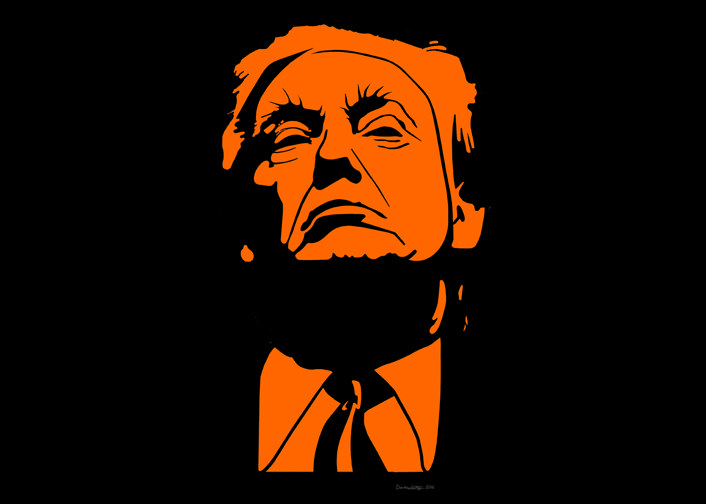You have no items in your cart. Want to get some nice things?
Go shopping
These are times of a politics of the either – or. Either you’re with Donald Trump, reveling in the epiphany that, once all complexities of 21st century reality are glossed over and ethical scruples are forgotten, you can swim with the most wonderful wave of certainty and unity – or you’re not a protestor, but a “professional agitator” to be blamed for any acts of violence committed against you. Either you’re with the UKIP inheritors of the commonwealth, or you’re welcoming jihadists into Europe, as Nigel Farage recently suggested speaking in the European Parliament. Populists bordering on the demagogical, politicians across the Western world have re-discovered the performative power of the speech act, which, as we know since Searle and Austin, can be used to construct realities under the guise of describing facts. This is a powerful move. Refusing to differentiate can engender an equally un-differentiated anger. Words are sites of exclusion and belonging, and this is precisely what populists turn to their advantage. Calling the camps at Calais ‘jungle’ is uncannily close to a colonial rhetoric of wilderness versus civilization. If spun further, this implies a warped logic whereby orderly nations need to protect themselves if they do not want to be swallowed up by the demands of people who, allegedly anarchically, want to be treated with the dignity guaranteed them in one of the most fundamental international conventions, the Human Rights Convention. UKIP’s Paul Nuttall’s call to re-label ‘refugees’ as ‘migrants’ is a similar move to construct a reality more suited to right-wing populist politics by rhetorical means. Words matter, and in this case such a re-definition would rid the West of the inconvenient need to act responsibly, humanely and in accordance with international asylum and refugee conventions.
Resisting these politics therefore entails a work of decoding. The aestheticization of politics into a luring spectacle plays into the hands of the likes of Donald Trump, yet a political aesthetic of critical reading, in turn, can help break through this sheen of rhetorical gesture. This is a challenge, because it becomes necessary to resist the tantalizing simplicity of these worldviews. It raises the question of how can we speak from a position of crisis in the face of a world in upheaval, without losing anchorage.
In her book “Through Other Continents. American Literature across Deep Time” (Princeton University Press: 2006) Wai Chee Dimock observes an interesting phenomenon. While staying at Walden Pond, author Henry David Thoreau bathes his intellect in the cosmogonal philosophy of the Bhagvat-Geeta. This sacred text of the Hindu religion traces a dispute between Krishna and Arjuna about the nature and justification of war, provoking Thoreau to consider whether the shedding of blood can ever be vindicated. This is a fascinating transnational dialogue in itself, in which philosophical ideas cross historical and national boundaries, and Hindu scripture reverberates in 19th century American thought. Yet it is more than that. This reading experience will later lead Thoreau to articulate a critique of war as de-humanizing power in “Resistance to Civil Government” (1849), and Dimock makes the argument that this essay, in turn, influenced Martin Luther King and Mahatma Gandhi.
What Dimock describes is essentially a dialogue between critical minds, re-developing theories of disobedience via experiences of active reading. This threaded, transnational pattern is global civil society at work in readers who are both skeptical and inspired, responsive and innovative. In consequence, reading itself becomes an act of creative resistance. Civil reading is disobedient reading, and as such it is an attitude that is fundamentally democratic and can be transposed into the contemporary context of political populism. Where Trump’s stark rhetoric inhibits dialogue, it insists on the right and responsibility to respond critically and individually. This might also be a way to re-think the public sphere from one defined by fear and vindictiveness, towards one of transnational critical debate.
I would like to conclude with another act of reading. In his 1918 “Dadaist Manifesto” in the wake of World War I, Tristan Tzara decries the classified “drawers of the brain” into which society compartmentalizes the knowledge of life. Without wanting to advocate the Dadaist’s nihilism in this context, I believe that such an awareness of our own cognitive drawers is a starting point for formulating our individual disobedient readings of political discourse. It is exactly those categories which we use to understand the world, of ‘us’ versus ‘them’, of security versus threat, of rights versus exploitation, which populist discourse threatens to appropriate to its own advantage. It is time to reclaim this power of definition.

About Katharina Donn
Katharina Donn’s first book, A Poetics of Trauma after 9/11", has been published by Routledge in 2016. She works internationally, between Germany and London, and is employed as associate lecturer and post-doctoral research fellow at the American Studies Department at the University of Augsburg. She has also held positions with the University of Texas at Austin and with the Institute of Advanced Studies at UCL. She enjoys being a transnational traveller, commuting between Germany and the UK, and works with the Brilliant Club at London state schools to advocate equality in education.




